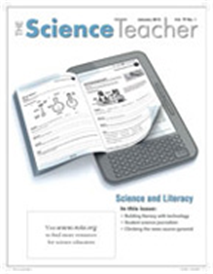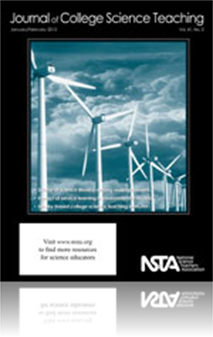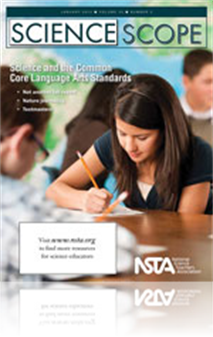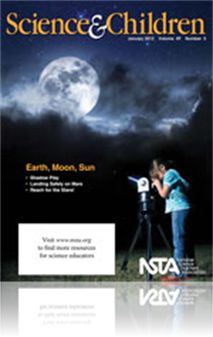All Resources
Journal Article
Idea Bank: Reading, Writing, and Physics
The Idea Bank provides tips and techniques for creative teaching, in about 1,000 words. This month’s Idea Bank discusses an assignment in which students read, write, and study current physics topics without diverting class time from the curriculum....
Journal Article
This Scholarship of Teaching and Learning project discusses the effectiveness of using distance metaphor-building activities along with a case study exam to help undergraduate nonscience majors understand and apply geologic time....
Journal Article
Core Ideas of Engineering and Technology
This article addresses Chapter 8 of A Framework for K–12 Science Education, which presents core ideas in technology and engineering at the same level as core ideas in the traditional science fields....
Journal Article
Long-Term Impact of Service Learning in Environmental Studies
Long-term impacts from a senior course in Environmental Studies were evaluated by a survey of program graduates who had participated in the course over an eight-year period. Survey respondents indicated that the course had stewardship, fostering the ...
Journal Article
Safer Science: Safety in Uncharted Waters
This column provides best safety practices for the science classroom and laboratory. This month’s issue discusses the safety of on- and off-campus independent study programs....
Journal Article
Collegiality and Better Science Teaching
Teachers strengthen content knowledge and share teaching strategies in a professional learning community to improve their science teaching. This article describes how the collaborative works, including its use of the environmental education program P...
Journal Article
This article provides three practical approaches to increase reading-to-learn competencies and student science achievement. These approaches also provide valuable information about student understanding of content....
Journal Article
The author developed a museum field trip into a short-term, active research project assignment. This approach has transformed the field trip from a casual museum visit into a focused and productive learning experience....
Journal Article
To encourage critical thinking and improve scientific literacy, the author created an open-inquiry lab experience that students work on three to four times a year based on major content shifts that students explore (ecology, physics, chemistry)....
Journal Article
The author examines important issues related to A Framework for K–12 Science Education, the Standards, and college teachers....
Journal Article
Tried and True: Using "Brags and Whines" as a Creative Writing Technique
This column provides classic demonstrations and experiments with a new twist. This month’s issue examines using brags and whines as an example of creative writing and provides steps for and the benefits of implementing these activities in the scien...
Journal Article
Science 2.0: Using Online Data
This column shares web tools that support learning. This month’s issue discusses using online scientific data....
Journal Article
Methods and Strategies: It's Child's Play
This column provides ideas and techniques to enhance your science teaching. This month’s issue discusses a novel way to use play to teach shadows....
Journal Article
While designing and building "Mars Landers," fourth-grade students engage in important engineering practices such as making models, testing designs, and comparing the effectiveness of different models. Students also create nonfiction books as they le...
Journal Article
Students observe shadows through various activities and at the same time, learn about seasonal change....
Journal Article
Scope on Safety: Slipping on Safety
This column shares safety information for your classroom. This month’s issue discusses how to help prevent slips, trips, and falls....
Journal Article
Engaging Undergraduates Through Interdisciplinary Research in Nanotechnology
A small public university recruits and retains more students in all science disciplines by implementing an interdisciplinary strategy focusing on nanotechnology and enhanced undergraduate research....
Journal Article
The Green Room: Environmental Science Lab Reports
This column focuses on making your teaching more environmentally friendly. This month’s issue discusses the importance of keeping clear, concise, and informative lab reports....
Journal Article
The author created a lesson in which students successfully practiced reading comprehension skills while developing an understanding of earthquakes....
Journal Article
Improving Active Learning by Integrating Scientific Abstracts Into Biological Science Courses
The author discusses using scientific abstracts in a genetics course. Students are introduced to topics via abstracts within lectures, as quiz material, and as homework to develop their understanding of how and why research is performed, what informa...
Journal Article
Scope on the Skies: Welcome to Mars
This column focuses on astronomy throughout the year. This month’s issue discusses Mars exploration....
Journal Article
Jump-Start Your Middle School Students' Background Knowledge and Vocabulary Skills
The authors share a favorite method for incorporating and reinforcing science vocabulary instruction in the classroom: jump pages....
Journal Article
Case Study: Stereochemistry of Drug Action: Case Studies With Enantiomers
This column provides original articles on innovations in case study teaching, assessment of the method, as well as case studies with teaching notes. This month’s case study exercise with optical isomers reinforces newly learned material on stereoch...
Journal Article
Formative Assessment Probes: The Daytime Moon
This column focuses on promoting learning through assessment. This month’s issue discusses misconceptions about when you can see the moon....
Journal Article
The Early Years: Seeing the Moon
This column discusses resources and science topics related to students in grades preK to 2. This month’s issue explores the formation of impact craters....
Journal Article
Students' science literacy can be assessed and enhanced by using writing activities in the science classroom. Students can use technical writing to communicate their lab experiences and creative writing to make connections to the topics they're learn...






